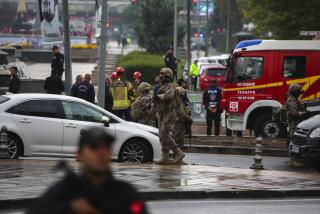The return of Turkey’s Kurdish problem
IF IRAN’S NUCLEAR ambitions, Iraq’s low-level civil war and the Israeli-Hezbollah war were not enough, President Bush may face a new dilemma. The Turkish government has ordered its military to prepare for an attack on 3,000 Kurdistan Workers Party insurgents living in Kurdish-dominated northern Iraq. Although the incursion by Turkey, a U.S. ally of 50 years, would be mostly for show, it would severely embarrass the Bush administration. No wonder the president twice talked to Turkish Prime Minister Recep Tayyip Erdogan last week.
But Erdogan’s moderately Islamist government is cornered. This month, two insurgent attacks inside Turkey killed 15 Turkish soldiers, and the prime minister vowed to fight back. Meanwhile, the war in Iraq has intensified Ankara’s biggest problem: the country’s restless minority Kurds.
Throughout its modern existence, Turkey has battled Kurdish political activism -- sometimes violently. After defeating the 15-year insurgency led by the Kurdistan Workers Party, or PKK, in 1999, the government failed to come up with a political solution to the social divisions and dismal living conditions of Turkey’s Kurds in the southeast. The insurgents recently abandoned their unilateral cease-fire and resumed their fight for independence.
The success of Iraqi Kurds in setting up a thriving autonomous state in northern Iraq has exacerbated matters. That example only emboldens Turkey’s Kurds to strike out on their own. Even worse for Ankara is the possibility that an independent Kurdish state will emerge in northern Iraq as the rest of Iraq descends into civil war.
Turkey has focused its frustrations on Washington. It blames the Iraq war for rekindling Kurdish aspirations throughout the region. It is embittered by the refusal of the U.S. to take on the PKK insurgents in Iraq despite Washington’s persistent declarations that their party is a terrorist organization. Many Turks believe that such hypocrisy can mean one of two things, equally nefarious: either that Washington is punishing Ankara for refusing to allow the U.S. to open a second front at the beginning of the Iraq war or that it is nurturing a pan-Kurdish state to be its proxy in the Middle East.
Turkey’s internal politics also have put Erdogan on the defensive. His government’s primary goal of deepening the country’s ties to the European Union is in danger of hitting a brick wall of European opposition because of Cyprus. Defying an agreement with the EU, Turkey has refused to open up its ports to Greek Cypriot shipping because its Turkish Cypriot brethren are barred from trading with Europe and the rest of the world.
Meanwhile, relations between Turkey’s civil and military authorities are at their lowest point since Erdogan became prime minister in late 2002. Suspicious that Erdogan has a hidden Islamist agenda, the generals have been exploring means by which to weaken him, if not force him out. They worry that either the prime minister or someone from his conservative religious entourage will ascend to the presidency -- parliament, which elects the president, is controlled by Erdogan’s party -- one of the most important and last bastions of secularism in Turkey. Erdogan also has been the target of a nationalist backlash -- not a majority movement yet -- that accuses him of being too soft on Europe, Cyprus, the U.S., the PKK and Iraqi Kurds.
Yet, Iraq is Erdogan’s Achilles’ heel. He can bat away most criticisms, but when it comes to the PKK insurgents taking refuge in northern Iraq, he’s trapped by his promise to retaliate for the deaths of the Turkish solders. The timing could not be worse. Israel’s retaliation against Hezbollah in Lebanon, a move profoundly unpopular in Turkey, has raised the ante for Erdogan. If Israel can unleash a punishing attack on terrorists, how can he do any less?
It would be a win-win proposition for the Turkish prime minister, although inaction could bring down his government. By delivering on his promise of retaliation and standing up to the Americans, Erdogan would burnish his nationalist credentials. He also would inoculate himself against the meddlesome generals, who are eager to counter Kurdish gains in northern Iraq.
Although a Turkish cross-border military move would embarrass the Bush administration, the U.S. may be able to tolerate it, especially if it took the form of just artillery attacks or airstrikes. But an operation involving large numbers of ground troops backed by tanks could cause mayhem in northern Iraq. It would inevitably clash with Iraqi Kurds, destabilizing the only relatively quiet sector in Iraq.
None of this should be happening. But Ankara has treated Iraqi Kurds with disdain while making no attempt to improve the domestic conditions of Turkey’s Kurds. The U.S., especially the Central Command, has shown little understanding of the political costs to Turks of the PKK’s presence in Iraq. And the Iraqi Kurds have refused to cut off supplies to the insurgents because they regard the PKK as a Turkish problem. The most consequential misstep came last fall, when the Turkish intelligence chief, Emre Taner, began talking with Iraqi Kurds on how to dispose of the PKK. The Iraqi Kurds were genuinely interested in doing a deal. But neither the Turkish government nor its military was willing to take the chance, and Washington, distracted by its multitude of problems, did not use its considerable influence with Iraq’s Kurds to push the negotiations forward.
The talks could be resuscitated if the U.S. gave them high-level attention. Bush has talked to Erdogan, and Secretary of State Condoleezza Rice has talked to her counterpart in the Turkish government. There may still be enough time to avert a crisis.
More to Read
Sign up for Essential California
The most important California stories and recommendations in your inbox every morning.
You may occasionally receive promotional content from the Los Angeles Times.









